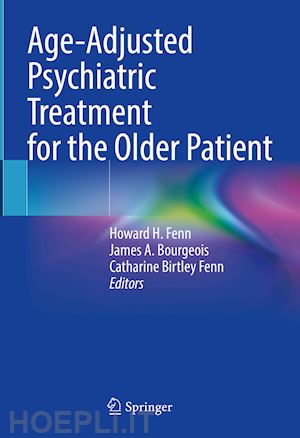
Questo prodotto usufruisce delle SPEDIZIONI GRATIS
selezionando l'opzione Corriere Veloce in fase di ordine.
Pagabile anche con Carta della cultura giovani e del merito, 18App Bonus Cultura e Carta del Docente
This book offers practical age-adjusted recommendations to treat the most common psychiatric symptoms and syndromes in the geriatric patient. The principles described here are not new; advice for prescribing to the aging patient has always been to “start low, go slow.” This book fleshes out that dictum based on research evidence, clinical experience, and trends in the literature. An age-adjusted approach endorses medication interventions when needed as part of a comprehensive treatment plan. A combination of psychotherapeutic interventions, non-pharmacological modalities, and judiciously managed medications can improve quality of life and minimize risks inherent in pharmacotherapy applied to aging physiology.
Age-Adjusted Psychiatric Treatment for the Older Patient is divided into five sections, covering the foundations of evaluation and treatment, neurocognitive disorders, psychiatric syndromes, therapeutics and interventions, and special topics. Each chapter begins with a complex case example that illustrates the topic. It then reviews current evidence-based evaluation and treatments. Age-adjusted recommendations, distilled from the literature, are offered at the end of each chapter. The intent is to provide actionable advice to supplement, but not supplant, good clinical judgement, which can improve quality of life by managing psychiatric symptomatology while averting untoward results.
This volume is an essential guide for experienced clinicians as well as trainees across many health care disciplines, both generalists and geriatric specialists, who all see increasing numbers of aged patients with psychiatric symptomatology.
Introduction.- Section I: Foundations of evaluation and treatment.- Chapter 01: Geriatric Pharmacology Overview.- Chapter 02: Essential Medical Evaluation.- Chapter 03: Laboratory studies, neuroimaging, and neuropsychological testing.- Section II: Neurocognitive disorders.- Chapter 04: Neuropsychiatric symptoms (NPS) and Neurocognitive disorders.- Chapter 05: Delirium.- Section III: Psychiatric syndromes.- Chapter 06: Substance Use Disorders.- Chapter 07: Sleep.- Chapter 08: Psychotic symptoms and syndromes.- Chapter 09: Anxiety Disorders.- Chapter 10: Depressive disorders.- Chapter 11: Bipolar and Related Disorders.- Chapter 12: Trauma- and Stressor-Related Disorders.- Section IV: Therapeutics and interventions.- Chapter 13: Neuromodulation Therapies.- Chapter 14: Psychotherapeutic interventions.- Chapter 15: Telemedicine and Digital Mental Health Technologies.- Section V: Special topics.- Chapter 16: Medical-Legal Topics.- Chapter 17: Nutraceuticals, Dietary, and Herbal Supplements.
Howard H. Fenn, MD
Clinical Associate Professor (affiliated)
Department of Psychiatry and Behavioral Sciences
Department of Medicine
Stanford University
Staff physician
Veterans Affairs Health Care System, Palo Alto, CA
James A. Bourgeois, OD, MD
Health Sciences Clinical Professor
Department of Psychiatry and Behavioral Sciences
University of California, Davis Medical Center
Sacramento, California
Catharine Birtley Fenn, PhD
Menlo Park
California











Il sito utilizza cookie ed altri strumenti di tracciamento che raccolgono informazioni dal dispositivo dell’utente. Oltre ai cookie tecnici ed analitici aggregati, strettamente necessari per il funzionamento di questo sito web, previo consenso dell’utente possono essere installati cookie di profilazione e marketing e cookie dei social media. Cliccando su “Accetto tutti i cookie” saranno attivate tutte le categorie di cookie. Per accettare solo deterninate categorie di cookie, cliccare invece su “Impostazioni cookie”. Chiudendo il banner o continuando a navigare saranno installati solo cookie tecnici. Per maggiori dettagli, consultare la Cookie Policy.